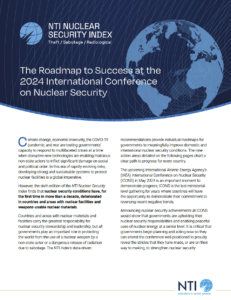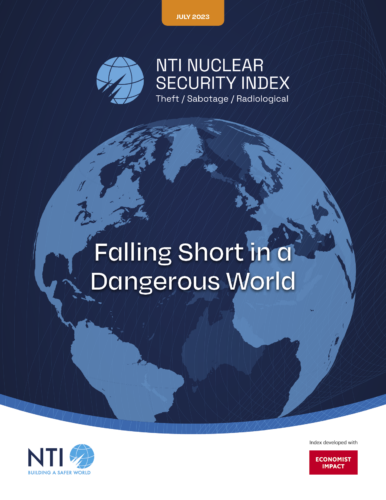Climate change, economic insecurity, the COVID-19 pandemic, and war are testing governments’ capacity to respond to multifaceted crises at a time when disruptive new technologies are enabling malicious non-state actors to inflict significant damage on social and political order. In this era of rapidly evolving risks, developing strong and sustainable systems to protect nuclear facilities is a global imperative.
However, the sixth edition of the NTI Nuclear Security Index finds that nuclear security conditions have, for the first time in more than a decade, deteriorated in countries and areas with nuclear facilities and weapons-usable nuclear materials.
Countries and areas with nuclear materials and facilities carry the greatest responsibility for nuclear security stewardship and leadership, but all governments play an important role in protecting the world from the use of a nuclear weapon by a non-state actor or a dangerous release of radiation due to sabotage. The NTI Index’s data-driven recommendations provide individual roadmaps for governments to meaningfully improve domestic and international nuclear security conditions. The nine action areas detailed on the following pages chart a clear path to progress for every country.
The upcoming International Atomic Energy Agency’s (IAEA) International Conference on Nuclear Security (ICONS) in May 2024 is an important moment to demonstrate progress; ICONS is the last ministerial-level gathering for years where countries will have the opportunity to demonstrate their commitment to reversing recent negative trends.
Announcing nuclear security achievements at ICONS would show that governments are upholding their nuclear security responsibilities and enabling peaceful uses of nuclear energy at a senior level. It is critical that governments begin planning and acting now so they can attend the conference well-positioned to proudly reveal the strides that they have made, or are on their way to making, to strengthen nuclear security.
The Road to Reviving Global Nuclear Security
Governments must accomplish—or commit to accomplish—as many recommendations as possible across these nine action areas and announce the status of their progress at ICONS in May 2024.
Action Area 1: Cap and Eliminate Civil Stockpiles of Separated Plutonium
Civil stockpiles of separated plutonium are growing rapidly, with the biggest increases coming from commercial reprocessing.
- All countries and areas, including those with no plutonium, should commit to capping separated plutonium inventories at current levels.
- Countries with plutonium should pledge to reduce their stockpiles as much and as quickly as possible.
- Countries and areas that have nuclear power, or are considering it, should pledge to avoid technologies that involve a plutonium fuel cycle.
Action Area 2: Strengthen Norms against Use of Highly Enriched Uranium (HEU)
Global inventories of HEU are gradually declining as global norms against civilian use of HEU solidify, but work remains to prevent backsliding.
- All countries and areas should cement norms against HEU use in civilian applications through clear political commitments, laws, or regulations.
- Countries with HEU facilities should contribute to the decline of HEU inventories by adopting low-enriched uranium alternatives and eliminating excess HEU inventories.
- Countries should make public declarations about quantities of civilian and military nuclear materials at regular intervals.
Action Area 3: Prioritize Nuclear Security in Times of Heightened Risk
Amid increasingly volatile risk environments, many governments are not demonstrating the capacity to meet today’s nuclear security challenges.
- All countries and areas, with support from international institutions, should strengthen norms and laws discouraging attacks on civilian nuclear facilities.
- Countries and areas with nuclear facilities should publicly communicate their plans to increase nuclear facilities’ resiliency in case of extended crises caused by natural or political shocks.
Action Area 4: Strengthen Nuclear Security Culture and Mitigate Insider Threats
Countries and areas with weapons-usable nuclear materials and nuclear facilities are falling short on two crucial and mutually reinforcing areas of nuclear security: security culture and insider threat prevention. Countries and areas with weapons-usable nuclear materials and nuclear facilities should:
- Share information about their programs designed to protect nuclear facilities against the two primary threats: multiple sophisticated insiders with deep knowledge of the facility and insiders collaborating with outsiders.
- Establish or bolster nuclear security culture programs that emphasize the importance of including diverse perspectives in nuclear security system development, implementation, and vulnerability assessments.
Action Area 5: Revitalize Nuclear Security Confidence Building
Among the 46 countries and Taiwan with nuclear facilities, support for new political and legal commitments and international assurances is faltering. Countries and areas with nuclear facilities should:
- Send ministerial-level representation to ICONS.
- Pledge to organize, support, and participate in a new global or regional head-of-state-level summit focused on reducing the risk of nuclear sabotage or theft.
- Express intent to host an IAEA International Physical Protection Advisory Service mission, follow through on that pledge, and publish the results.
- Subscribe to IAEA Information Circular 869 (Strengthening Nuclear Security Implementation), 908 (Mitigating Insider Threats), and other nuclear security-related IAEA Information Circulars (INFCIRCS 899, 901, 904, 905, 909, 912, 917, and 918).
- Disclose recent improvements to nuclear security implementation and regulations and publish nuclear security-focused annual reports.
Action Area 6: Strengthen Legal Frameworks to Support Nuclear Security Globally
The number of countries fulfilling their outstanding obligation to effectively protect nuclear materials and facilities has nearly doubled.
- All countries and areas should ratify the Convention on the Physical Protection of Nuclear Material (CPPNM), its amendment, and the International Convention for the Suppression of Acts of Nuclear Terrorism.
- States parties to the amended CPPNM should submit their nuclear security laws and regulations to the IAEA as required by Article 14.1 of the treaty.
Action Area 7: Build an Inclusive Narrative about the Importance of Nuclear Security
Countries in the Global South have made great improvements to their nuclear security conditions, although significant work is still to be done.
- Countries in the Global South should continue positive progress around nuclear security by ratifying the amended CPPNM if they have not done so already and subscribing to IAEA nuclear security INFCIRCs.
- In the ICONS ministerial declaration and national statements, all governments should advance an inclusive narrative about the universal benefits of strong and sustainable nuclear security and the important role of every country and area in creating and maintaining a durable and resilient global nuclear security system.
Action Area 8: Galvanize Support for the International Atomic Energy Agency
Despite the dangerous combination of volatile risk environments and growing interest in nuclear energy, governments are not providing the IAEA with much-needed, consistent support. All countries and areas should:
- Contribute financial and human resources to support the IAEA’s nuclear security mission and the World Institute for Nuclear Security.
- Participate in the IAEA’s Nuclear Security Guidance Committee.
Action Area 9: Implement Essential Radiological Security Measures
Since 2020, countries and areas have made minimal progress on radioactive source security and are not sufficiently adhering to baseline radiological security measures. All countries and areas should:
- Identify and describe their laws and measures that protect radioactive sources from theft and plans to strengthen them.
- Describe the status of regulatory measures to track and control the movement of radioactive sources, including a national registry.


